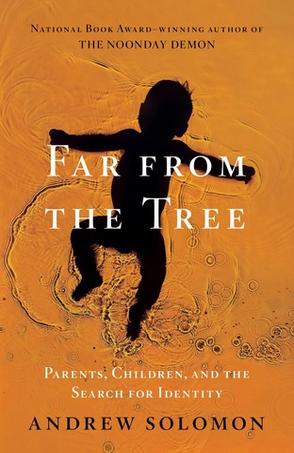-

Far From the Tree
From the National Book Award–winning author of The Noonday Demon: An Atlas of Depression comes a monumental new work, a decade in the writing, about family. In Far from the Tree, Andrew Solomon tells the stories of parents who not only learn to deal with their exceptional children but also find profound meaning in doing so. Solomon’s startling proposition is that diversity is what unites us all. He writes about families coping with deafness, dwarfism, Down syndrome, autism, schizophrenia, multiple severe disabilities, with children who are prodigies, who are conceived in rape, who become criminals, who are transgender. While each of these characteristics is potentially isolating, the experience of difference within families is universal, as are the triumphs of love Solomon documents in every chapter. All parenting turns on a crucial question: to what extent parents should accept their children for who they are, and to what extent they should help them become their best selves. Drawing on forty thousand pages of interview transcripts with more than three hundred families, Solomon mines the eloquence of ordinary people facing extreme challenges. Whether considering prenatal screening for genetic disorders, cochlear implants for the deaf, or gender reassignment surgery for transgender people, Solomon narrates a universal struggle toward compassion. Many families grow closer through caring for a challenging child; most discover supportive communities of others similarly affected; some are inspired to become advocates and activists, celebrating the very conditions they once feared. Woven into their courageous and affirming stories is Solomon’s journey to accepting his own identity, which culminated in his midlife decision, influenced by this research, to become a parent. Elegantly reported by a spectacularly original thinker, Far from the Tree explores themes of generosity, acceptance, and tolerance—all rooted in the insight that love can transcend every prejudice. This crucial and revelatory book expands our definition of what it is to be human. -

A Hologram for the King
In a rising Saudi Arabian city, far from weary, recession-scarred America, a struggling businessman pursues a last-ditch attempt to stave off foreclosure, pay his daughter's college tuition, and finally do something great. In "A Hologram for the King," Dave Eggers takes us around the world to show how one man fights to hold himself and his splintering family together in the face of the global economy's gale-force winds. This taut, richly layered, and elegiac novel is a powerful evocation of our contemporary moment -- and a moving story of how we got here. -

The Patriarch
Celebrated historian David Nasaw brings to life the story of Joseph Patrick Kennedy, in this, the first and only biography based on unrestricted and exclusive access to the Joseph P. Kennedy papers Joseph Patrick Kennedy—whose life spanned the First World War, the Roaring Twenties, the Great Depression, the Second World War, and the Cold War—was the patriarch of America’s greatest political dynasty. The father of President John F. Kennedy and senators Robert and Edward Kennedy, “Joe” Kennedy was an indomitable and elusive figure whose dreams of advancement for his nine children were matched only by his extraordinary personal ambition and shrewd financial skills. Trained as a banker, Kennedy was also a Hollywood mogul, a stock exchange savant, a shipyard manager, the founding chairman of the Securities and Exchange Commission, and ambassador to London during the Battle of Britain. Though his incredible life encompasses the very heart of the American century, Joseph Kennedy has remained shrouded in rumor and prejudice for decades. Drawing on never-before-published material from archives on three continents, David Nasaw—the renowned biographer of Andrew Carnegie and William Randolph Hearst—unearths a man far more complicated than the popular portrait. Was Kennedy an appeaser and isolationist, an anti-Semite and Nazi sympathizer, a stock swindler, a bootlegger, and a colleague of mobsters? Did he push his second son into politics and then buy his elections for him? Why did he have his daughter Rosemary lobotomized? Why did he oppose the Truman Doctrine, the Marshall Plan, the Korean War, and American assistance to the French in Vietnam? What was his relationship to J. Edgar Hoover and his FBI? How did he influence his son’s politics and policies in the White House? In this groundbreaking biography Nasaw ignores the tired old answers surrounding Kennedy, starting from scratch to discover the truth behind this misunderstood man. Though far from a saint, Joseph Kennedy in many ways exemplifies the best in American political, economic, and social life. His rags-to-riches story is one of exclusion and quiet discrimination overcome by entrepreneurship, ingenuity, and unshakable endurance. Kennedy’s story deserves to be told in full, with no holds barred, and Nasaw’s magnificent The Patriarch is the first book to do so.